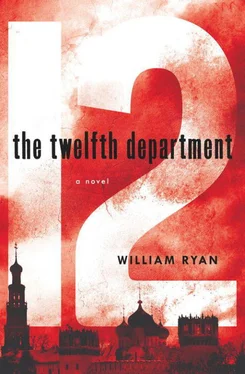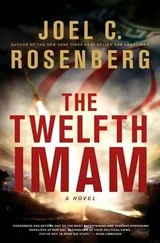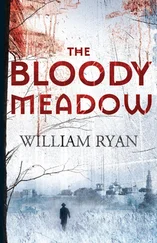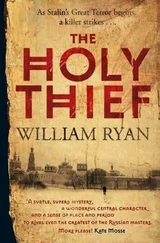“We brought some,” Korolev began, but then he looked at Yuri and wondered if he’d brought enough. “But if you’re passing, we could probably do with more.”
He found his wallet and handed him two five-rouble notes. There was no point in asking for anything in particular—Lipski would get them what was there. That was the way things worked in village shops.
“I’ll bring you change, don’t worry about that.” Lipski nodded over his shoulder in the general direction of the river. “They’ve turned the old monastery into some sort of summer camp for children and they’ve been bringing orphanage kids out from Moscow the last few weeks. Not many of them Pioneers, I can tell you—as rough a bunch as I ever saw. A lot of people avoid the river when they bring them down to swim, just so you know.”
Korolev thanked him for the tip and they said their farewells.
“What was all that about?” Korolev asked Yuri, when they’d walked inside.
“What do you mean?”
“You went very quiet.”
“I don’t know him.”
Yuri’s expression seemed to be a mixture of stubbornness and uncertainty.
“He was being friendly. Don’t they teach you to respect your elders at school?”
Yuri considered this for a moment. “They teach us to respect those who strive for socialism and to judge each citizen on their merits. For all I know, that fellow could be a Fascist spy.”
“A Fascist spy? I know him, Yuri. He fought for four years with the Red Cavalry. He’s a good comrade. He’s sure as hell no Fascist.”
“Pavel Anatoliyevich says that the older comrades have to be watched no matter what they say they did.” Yuri spoke as if reciting something learned by heart. “He says that some of the old comrades were never real socialists. He says they just fought on our side to save their skins.”
Korolev didn’t speak for a moment. When he did allow himself to say something he kept his voice low and even. “Who is this Pavel Anatoliyevich?” Korolev had to admit he didn’t like the sound of the fellow.
“He’s the teacher who leads our school’s Pioneer detachment.”
“And this Pavel Anatoliyevich—where did he fight? Back when fellows like Lipski and me were spilling our blood for the Revolution.”
Yuri looked embarrassed on behalf of his teacher.
“He didn’t fight—he was too young. But he’s a glider pilot.”
“I see—a glider pilot.” Korolev didn’t mean to sound as dismissive as he did—but it was some sorry state of affairs when young whippersnappers with an aeronautical interest were allowed to criticize men who’d fought with Budyenny against all comers and lived to tell the tale.
“He says many of the old comrades are contaminated by their past,” Yuri said, a stubborn look about him now. “He says they can never become real socialists. He says Soviet youth, who’ve grown up in a socialist society, will protect the Revolution in the future.”
“You think I’m contaminated by my past, perhaps?”
Yuri didn’t seem to hear the irritation in his voice, which was probably just as well. The boy shook his head.
“They don’t give the Order of the Red Star to just anyone. Pavel Anatoliyevich said so.”
A teacher, Korolev thought to himself, should teach—not express opinions on their student’s parents, even positive ones.
“Whoever he is,” Korolev said, “you weren’t supposed to tell anyone about the medal, were you?”
Yuri shook his head to indicate it hadn’t been a disclosure he’d made lightly.
“I’m sorry—but I’m not allowed to keep secrets from Pavel Anatoliyevich. A Pioneer must always be honest with the leadership. And he wanted to know about you.”
Korolev felt his attention sharpen.
“When was this, Yuri? When was he asking you these questions?”
“In March—after you visited. He wanted to know all about you. To make sure I came from a good Socialist background. When I told him you were a captain with the Moscow Militia and had been awarded the Order of the Red Star, he thought I was lying—but he must have investigated it, because later on he apologized to me in front of the whole class. He said you’d done the State a great service and promoted me to Team Leader on the spot.”
“He did, did he?” Korolev wondered how a teacher of primary-school children from Zagorsk was able to find out what he’d done to earn the medal. Particularly when most of Moscow CID didn’t know—and didn’t dare ask either. “What other questions did he ask, when he was asking them?”
“The same he asks all of us—about the loyalty of our parents. If our parents express opinions against Soviet Power. Whether our parents engage in antisocial behavior—whether they are cultists. We have to give a list of the books we have at home before we can even join.”
It seemed that to Yuri this was as commonplace as being asked what your favorite color was. Not that Korolev was surprised—everyone knew that Pioneers were told their first loyalty was to the State, rather than their family. It was why adults were careful what they discussed in front of children—in case something might be misinterpreted by young ears or, even worse, not misinterpreted at all.
“You had to give them a list of Zhenia’s books?”
“Every single one. Some of the kids’ folks have no books at all—they’re the lucky ones.”
It occurred to Korolev that they weren’t just lucky, but sensible as well. Who knew which writers might be out of favor at any one time—these things weren’t always announced. He sighed and Yuri looked up at him, his eyes wide and his mouth curving downward.
“Is it because of the list that Mother’s in trouble?”
Korolev had been waiting for an opportunity to discuss Zhenia’s situation, and this, it seemed, was it. He put a hand on the boy’s shoulder.
“What trouble, Yuri?”
“I don’t know,” Yuri said, his face a picture of misery. Two fat tears rolled down his cheeks.
“You probably know more than you think—tell me why you think she’s in trouble for a start.”
Yuri pushed a hand across his face and looked up to meet Korolev’s gaze.
“Some men came last week. They took away Mother’s papers and some of her books.”
It came out little louder than a whisper. Korolev leaned forward.
“These men, Yuri,” Korolev asked. “Who were they?”
“They didn’t say—they only said they had a warrant. They brought the house manager and the old woman from the bakery with them, but they just sat around.”
“Did the men have uniforms?”
“No.”
“I see.” The house manager and the old woman would be witnesses, required by Soviet law to be there during the search—which meant it was a formal investigation of some kind. The men had almost certainly been Chekists.
“Tell me everything they did and said, Yuri. From the beginning. And everything about this Pavel Anatoliyevich fellow as well.”
And, in between the sobs and the tears, Yuri did as he was asked, and Korolev liked little of what he heard. The search itself wasn’t likely to have come up with anything much—not in the papers anyway. Zhenia was no counterrevolutionary—on the contrary, she was a loyal Party member of twenty-odd years standing. But books could produce unforeseen problems—for all he knew, Lenin would end up on a forbidden list one of these days. Babel said there were librarians whose fulltime jobs it was to burn banned works, and others who spent their days erasing references to the arrested and exiled from the books that were left.
“And after they went,” Yuri said, finishing his story. “After they went, Grechko—the house manager—he spat on the floor. On our floor. He said we were saboteurs and Trotskyists—all of us. And Mother said nothing—just cleaned it up and carried on as if nothing had happened. And then Grandfather made tea.”
Читать дальше












